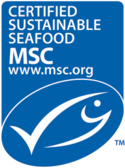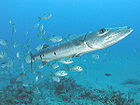- Marine Stewardship Council
-
Marine Stewardship Council Type Non-profit organization Industry Sustainable seafood ecolabel programme Founded 1997, London, England Headquarters Marine House, 1 Snow Hill, London, EC1A 2DH, United Kingdom Website www.msc.org The Marine Stewardship Council (MSC) is an independent non-profit organization with an ecolabel and fishery certification programme. Fisheries that are assessed and meet the standard can use the MSC blue ecolabel. The MSC mission is to 'reward sustainable fishing practices’. When fish is bought that has the blue MSC ecolabel, it should indicate that this fishery operates in an environmentally responsible way and does not contribute to the global environmental problem of overfishing. As of October 2011, more than 2,021 fisheries and companies had achieved a Marine Stewardship Council certification. [1]
Contents
Principles
The MSC environmental standard for sustainable fisheries was developed over two years through a consultative process. The three principles of the MSC standard consider:
- The condition of the fish stock(s) of the fishery
- The impact of the fishery on the marine ecosystem
- The fishery management system
The MSC standard is consistent with the ‘Guidelines for the Eco-labelling of Fish and Fishery Products from Marine Wild Capture Fisheries’ adopted by the UN Food and Agriculture Organisation (FAO) in 2005. Any fishery that wishes to become MSC certified and use the ecolabel is assessed against the MSC standard by a third party, independent certification body that has been independently accredited to perform MSC assessments by Accreditation Services International (ASI). Chain of custody certification along the supply chain from boat to point of sale ensures that seafood sold bearing the ecolabel originated from an MSC certified fishery.
The MSC is headed by the Chief Executive who reports to the Board of Trustees. This is supported by the Technical Advisory Board and the Stakeholder Council, (further information on MSC governance). The MSC programme works through a multi-stakeholder partnership approach, taking into account the views of those seeking to secure a sustainable future.
History
The MSC was founded in 1997 by the World Wide Fund for Nature and Unilever, and became fully independent in 1999.
It has offices in London (its head office), Seattle, Washington and Sydney, New South Wales and local offices in Edinburgh, Berlin, The Hague, Paris, Cape Town and Tokyo.
As of October 2011, there are over 11,000 seafood products available with the MSC ecolabel, sold in 82 countries around the world. 131 fisheries have been independently certified as meeting the MSC’s environmental standard for sustainable fishing and 131 are currently undergoing assessment, (further information on fisheries engaged in the MSC programme). 1,896 companies have met the MSC Chain of Custody standard for seafood traceability.
MSC and aquaculture
The Marine Stewardship Council is a programme for wild fisheries and does not include aquaculture production. However, the MSC programme can contribute to sustainable outcomes along the aquaculture production chain through the certification of feed fish fisheries. As of October 2010 there is one fishery undergoing assessment for MSC certification that produces for fishmeal – the Gulf of California sardine fishery. About 85% of the total production from the Gulf of California sardine fishery is used for reduction to fishmeal and mostly used for animal feeds.
Fish & Kids
Fish & Kids is a project of the Marine Stewardship Council that encourages schools and restaurants in England and Sweden to serve sustainable, MSC labelled seafood. Fish & Kids also aims to raise children’s awareness of sustainable food issues through a classroom resource pack and website using fun games and educational materials.
Independent opinion and criticism
Jared Diamond's Collapse praises MSC and the similar Forest Stewardship Council as good examples of collaboration among environmentalists and businesses for a sustainable economy.
In early 2010, the MSC was criticised for including the British Columbia sockeye fishery in the certification process[2]. This is because in 2009, just a fraction of the salmon returned to the Fraser River, which prompted the Prime Minister to launch a judicial enquiry.[3]
Scientists at a Simon Fraser University (SFU) summit of Fraser River Sockeye Salmon said of the low salmon run: “In 2009 fisheries responded appropriately by greatly restricting fishing to maximize the number of fish available for spawning. The weight of evidence suggests that the problem of reduced productivity occurred after the juvenile fish began their migration toward the sea.”
The total 2010 Fraser River sockeye return was over 35 million fish; the largest return since 1913.[4]
MSC certification of the B.C. sockeye fishery is confirmation that the management of the fishery aims to ensure that fish stocks remain above critical lower limit levels. Certification was not a conclusion that the stock was currently abundant or that fishing should be taking place at that time.
References
- ^ [1] List of Companies certified to MSC
- ^ "MSC criticised for sockeye certification." Fish Information and Services
- ^ "Missing salmon stocks to be probed: PM." Fish Information and Services
- ^ "Pacific Salmon Commission."
External links
- Marine Stewardship Council Website
- MSC website for teachers and children
- Where to buy MSC-labelled seafood
Categories:- Seafood
- International environmental organizations
- Fisheries organizations
- Ecolabelling
Wikimedia Foundation. 2010.




